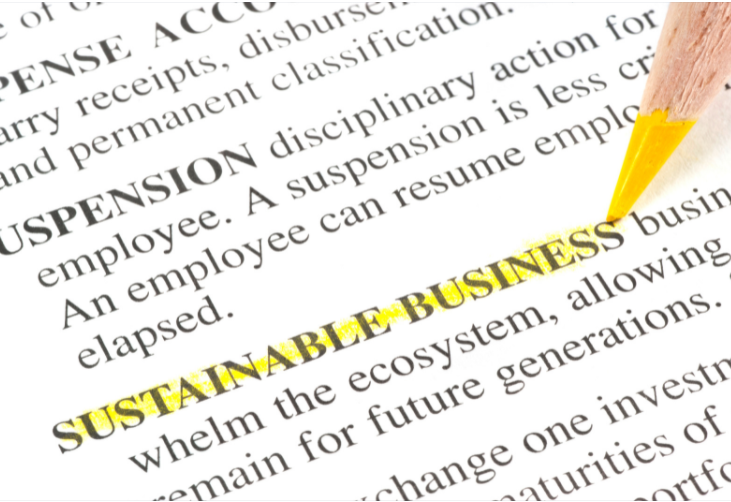how can businesses become more sustainable? 

02/06/2021
By Emily Matthews
This week, I sat down with Mikaela Orme, a Sustainability Manager at Martin Brower. Mikaela has a B.S.C in Biology, a Graduate Diploma in Environmental Management and a huge passion for the environment and waste management. Now, more than ever, incorporating sustainability into your business is an important step in the right direction, but it isn’t always as easy as it may seem! Keep reading to see Mikaela’s tips on just how you can do this!
Can you describe the difference between sustainability and being environmentally friendly? Is there one?
Being environmentally friendly is specifically to do with actions that positively affect the environment, whereas sustainability is a much broader term and is more widely applicable. Being sustainable involves being environmentally friendly, but also considers social and economic factors.
The 1987 UN Brundtland Commission Report ‘Our Common Future’ stated that the essence of sustainability is meeting the needs of people in the present, without impacting the ability of people in the future to meet their own needs. So, ensuring that people are getting what they need now, without jeopardising our future generations quality of life, or the resources that will be available to them.
People in the industry use a wooden stool analogy to explain sustainability and the importance of a balanced world. Being sustainable is the seat of a 3-legged stool and then the environment, our community and the economy are the legs. Obviously, all these legs need to be balanced, otherwise the stool topples over.
Why did you decide to go into the field of sustainability?
I’m sure lots of people can relate to this, but I was just looking to get into an industry or job where I felt I could make a difference and have a positive impact on the world. A great thing about sustainability, is that it is applicable in so many different roles and industries. I started my career in waste – an industry where your sustainability efforts are very tangible so you can see the difference that you’re making, but there are many other roles you can work in that envelopes the sustainability theme. Whether that be construction, or marketing or becoming a sustainable blogger – there are so many different avenues to choose from if you do want to go into it.
What is the most surprising or shocking thing you have learned or come across in your career?
So, so much! For example, some of my favourite (also most horrifying) statistics include if food waste were a country, it would be the third largest emitter of carbon in the world – which is massive! Another crazy fact is that by 2050, there would be more plastic in the ocean by weight than fish!
Do you think these environmentally focussed documentaries that are being produced are doing good, or they are scaremongering?
This is a tricky question – I think it is a bit of both. They are great for raising awareness, but I do think they can border on scaremongering. Even though it’s a documentary, they are still selling an agenda in one way or another and so I’m always careful with what I accept at face value. A lot of the time, the information they provide does not give the whole picture – they need to make it entertaining, right!

Another concern I have with some of these documentaries is how they focus so heavily on the extremes. It can be portrayed that being environmentally friendly is almost an all or nothing approach – to the point that if you don’t commit entirely, you’re demonised for it. I believe that we should view being environmentally friendly, whether that be eating more plant-based or reducing your waste generation, with much more balance and it should be much more accessible for people so that we encourage people to participate, no matter how big or small.
When I went to Vietnam, it was beautiful, but it really was plastic plastic plastic
This is a good example of my point before. A lot of people demonise plastic, but the reality is, it serves as an important function to prevent food waste – plastic is useful to preserve food, so consequently, less food goes to landfill than it would otherwise. Vietnam does unfortunately have have a plastic litter problem – but it’s not just because there is too much plastic, but also because they don’t have the infrastructure needed to manage it. Looking at the situation with balance is very important in these conversations.
What are good ways to encourage your employees to take part in sustainability efforts?
I think the most important part in encouraging participation is good communication and incorporating sustainability into the company culture. Start by identifying your company values and then setting the goals you want to reach based on those values. Not all sustainability goals or initiatives are going to be relevant to every business. Consider how initiatives fit into who you are as a company and what you can financially, physically, and realistically do. Communicate this to your employees, e.g., tell them that your goal is to recycle more or reduce your waste by X % and then educate them on how and why and when.
I think this education phase is where some businesses run into problems – they set up all these systems and it’s really great – but they don’t follow through with enough education. In my last role I visited many different types of businesses to educate them on recycling best practices and just how they can reduce their waste overall. The one point I always tried to make was that education does take time and does need to be done on a regular basis to ensure long-term compliance and participation.
What factors do you consider when proposing a sustainability initiative?
It really comes down to creating a tailored solution for each business – there is no cookie cutter approach to this. I start by looking at what their goals are as a business and what they are looking to achieve, whether that is waste reduction or carbon reduction, and then we tailor an approach to what is going to be most suitable. Say, from a waste reduction perspective, it might not be worthwhile focusing your efforts on recycling soft drink cans etc from a very small office space as the volumes will likely be too low, but maybe there is a lot of cardboard going into general waste that can save you money by being recycled. It’s all about assessing specific business operations and what changes they can realistically make – figuring out how businesses can be sustainable for the long term and not just doing it to tick a box.
It’s also about being smart about the approach. For example, you can often end up putting in a lot of resources to achieve a specific goal, when they could get a better outcome by approaching it differently. For example, a company could be trying to use more sustainable products, such as glass over plastic. Glass over plastic is a good idea in theory; glass is a more environmentally friendly product than plastic, but, when you do a life-cycle assessment on glass, you find out it can use a lot more resources to create it and the process can emit more emissions. Glass is more expensive than plastic, which then impacts affordability for communities. Instead, an alternative approach is to identify a legitimate and robust recycling process that can circulate the material back into your supply chain.
This is a broad question, but how can businesses become more sustainable and is it different for SMEs compared to larger corps?
My best piece of advice is to try and incorporate sustainability as a culture change as opposed to a work stream you have to manage – this way improvements will start to naturally occur. To a point it’s different dependant on the size of a business, the scale and resources able to be dedicated to initiatives change, but the essence of it is all the same.
Are you seeing an increase in people taking part in environmentally friendly actions and be more receptive in taking on this new behaviour?
Yes, absolutely! I mean, just in the last few years I have seen a dramatic increase in people actually wanting to educate themselves on things like proper waste management. Just recently in my current role, I held a presentation to our ANZ employees on waste as part of a Sustainability Week – I think initially people thought it might be a bit dull, but it became a lot of peoples highlight! I mean, we don’t know what we don’t know, right!
Is it more expensive to buy recycled or ethically sourced products and if so, why?
It can be more expensive. And the reasons are varied, but as an example it might be due to the fact that the materials or ingredients are sourced locally and therefore labour prices are higher – these workers are paid a living wage (which doesn’t always happen!). Supply and demand can also be a major factor as well. If people would rather buy the cheaper object, then the producer might not be producing this product in scale, meaning it’s more expensive per unit. A lot of factors come into play when explaining why ethically produced products can be more expensive.
As a consumer, you need to weigh it up right? Maybe some of these products are more expensive upfront, but will last you forever, as opposed to something that is cheaper now, but you will have to replace it multiple times. Yet, it may not be feasible to invest like this, so we need to remember that it’s not necessarily individual action that always needs to change – it’s up to the manufacturers of these products to create them a way where they can be composted, re-used, or recycled. A lot is happening in the industry now which encourages this change; producers are starting to design products with the final destination in mind.

Is it the company’s responsibility to educate their staff on sustainability? If so, how can they go about doing this?
Yes, if sustainability is a focus, I personally think so. Even though sustainability as a concept isn’t new, some of it is to the masses. There is the idea around businesses being a ‘responsible corporate citizen’, where businesses are responsible for the impact they have within communities. I believe a part of this is being responsible for engaging and educating your staff on the ideas. If you are serious about it than luckily there are so many resources out there to help with this. Some fun activities could be getting involved in Earth Day and reading through the accompanying resources with your team or participating in Clean Up Australia Day! Education doesn’t have to be dry.
So, I am from the UK and there they are so strict on recycling. Each household has to have at least 3 recycling bins and that’s mandatory. In Australia, in my opinion it is a bit more relaxed. Do you know why that is?
It is a cultural difference but is also down to the resources available to each country. For example, the UK has a high population, but not much land space available for landfill and dumps. So, as a necessity, they have had to invest in an alternative infrastructure to manage their waste and recycling. They can’t just bury it in a hole in ground like Australia do.
As Australia can actually dispose of its waste and dispose of it relatively quickly and cheaply at that, we have unfortunately created an out of sight, out of mind mindset. Even though we can put it to landfill, doesn’t mean we should. This mindset is shifting however, and we are seeing this happen at a higher level. For example, Governments are looking at standardising the bin systems across the country to make it easier for people to understand recycling rules and have more and more focus on achieving country wide recycling targets. Also, states are rolling out more resources and services to their councils, so for example, Victoria now have a mandatory 4 bin system for households to recycle. These are all changes in the right direction.
The main take away from this chat is that whether you are a business, or an individual, you don’t need to do everything at once. Think of becoming more sustainable as a journey. Tackle one thing at a time, and focus on the low hanging fruits – think, what actions are the easiest to start the momentum and maintain and build from there. I hope you found this interview as useful and as eye-opening as we certainly did!
Be sure to stay tuned to find out who we are chatting to next in this interview series!
BACK

